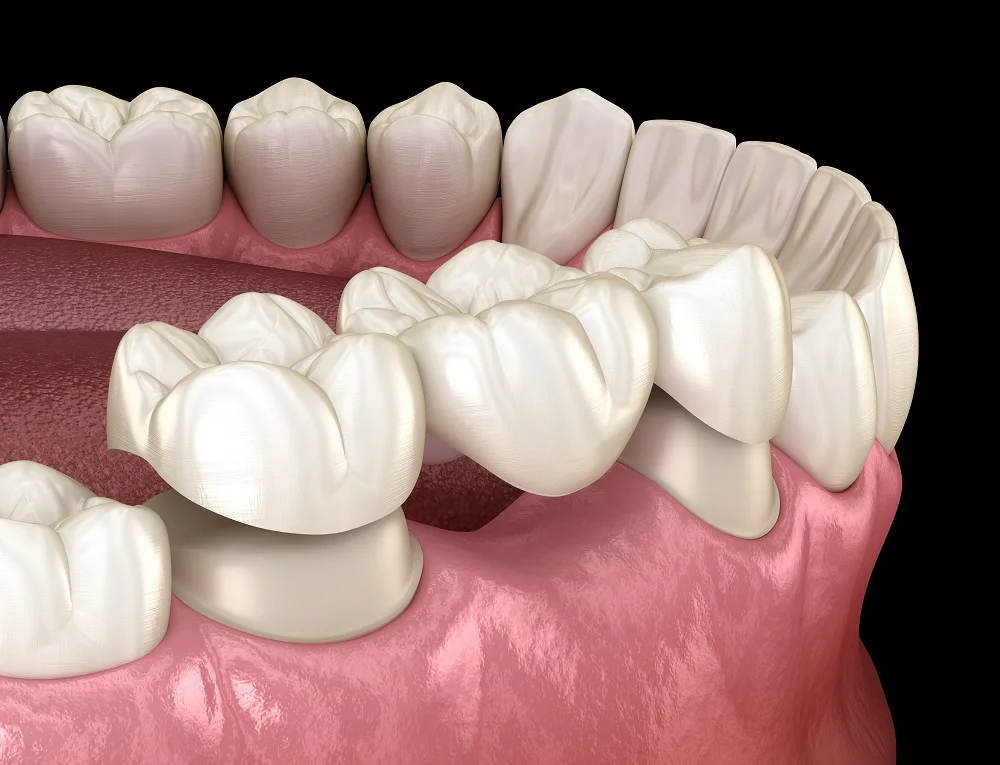
Implant-Supported Bridges
Your teeth are an essential feature in your mouth, performing numerous important tasks every single day. Tooth loss has a major impact on all of these functions. Once simple tasks suddenly become difficult. You may even experience consequences you never considered. As a result, your quality of life can be greatly diminished. For sections of missing teeth, here at Edelweiss Dental Implant Center, we offer implant-supported bridges.
What Happens When You Lose Your Teeth?
Missing teeth have several impacts on your oral health, your appearance, and your quality of life:
- Eating becomes more difficult: Without teeth, even just a few, biting and chewing your favorite foods becomes more of a challenge. Without the ability to thoroughly chew your food, your nutrition can also suffer.
- Speaking becomes more difficult: Your teeth control airflow when you speak. Missing teeth can lead to a lisp or other speech issues.
- Your smile is impacted: Depending upon the location of your missing teeth, your smile may be affected.
- Increased risk for tooth decay and gum disease: The empty spaces are harder to keep clean. Food, bacteria, and other debris can linger, leading to tooth decay on adjacent teeth as well as gum disease.
- You have increased bone loss: Your teeth stimulate your jawbone, which tells your body to send vital nutrients. Without even just a few teeth, the message is weakened, and fewer nutrients are sent. Your jaw begins to grow weak and alter its shape over time. This does not only alter the shape of your jaw (which can cause your other teeth to move out of alignment), it can also alter the shape of your face, causing you to look older.
How Are Missing Teeth Typically Replaced?
Traditionally, sections of missing teeth are replaced in one of two ways. Depending upon the number of teeth missing, the traditional options consist of a dental bridge (one to three missing teeth) and a partial denture (more than three missing teeth). A dental bridge consists of your missing tooth (or teeth) set between two crowns. The crowns then anchor onto the adjacent healthy teeth. A partial denture, on the other hand, is a removable prosthesis. False teeth are set into a colored gum base that is supported by your gum tissue. It also has metal clasps, which hook onto your healthy teeth, providing additional support. These options are effective at replacing teeth, but they do have some downsides. The biggest disadvantage of both options is that they cannot stop the bone loss that accompanies tooth loss. This means that they will need to be periodically replaced as your jawbone changes shape.
What is an Implant-Supported Bridge?
An implant-supported bridge is a type of dental implant. Small titanium rods are surgically inserted into the jawbone, meant to support your section of replacement teeth. The implants rely on a process known as osseointegration, or the fusion of your bone to the implants. As you heal, the implants become the “roots” that support your new teeth, which are secured permanently in place by screws. While healing from surgery can take several months, an implant supported bridge is designed to be a permanent solution to tooth loss.
The Benefits of an Implant-Supported Bridge
Implant supported bridges have a multitude of benefits:
- The functions of your mouth are restored.
- Your oral health is improved.
- Your smile and your confidence are restored.
- Your replacement teeth are more comfortable. Rather than being supported by your gums (like a partial denture), your teeth are supported by the implants.
- There is no need to remove enamel from perfectly healthy teeth.
- Because the implants mimic the functions of the roots of your teeth, the bone loss typically associated with tooth loss is stopped.
